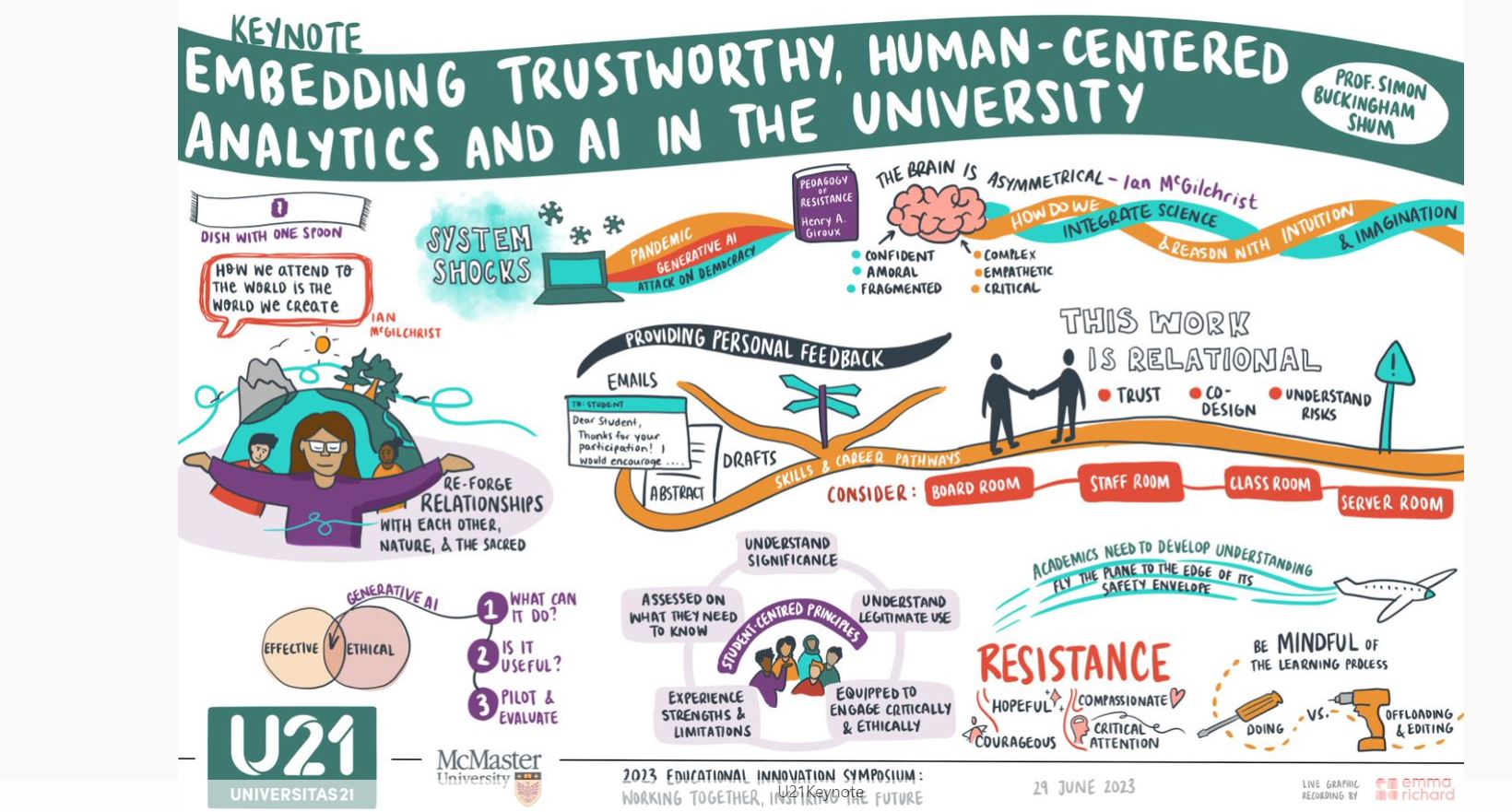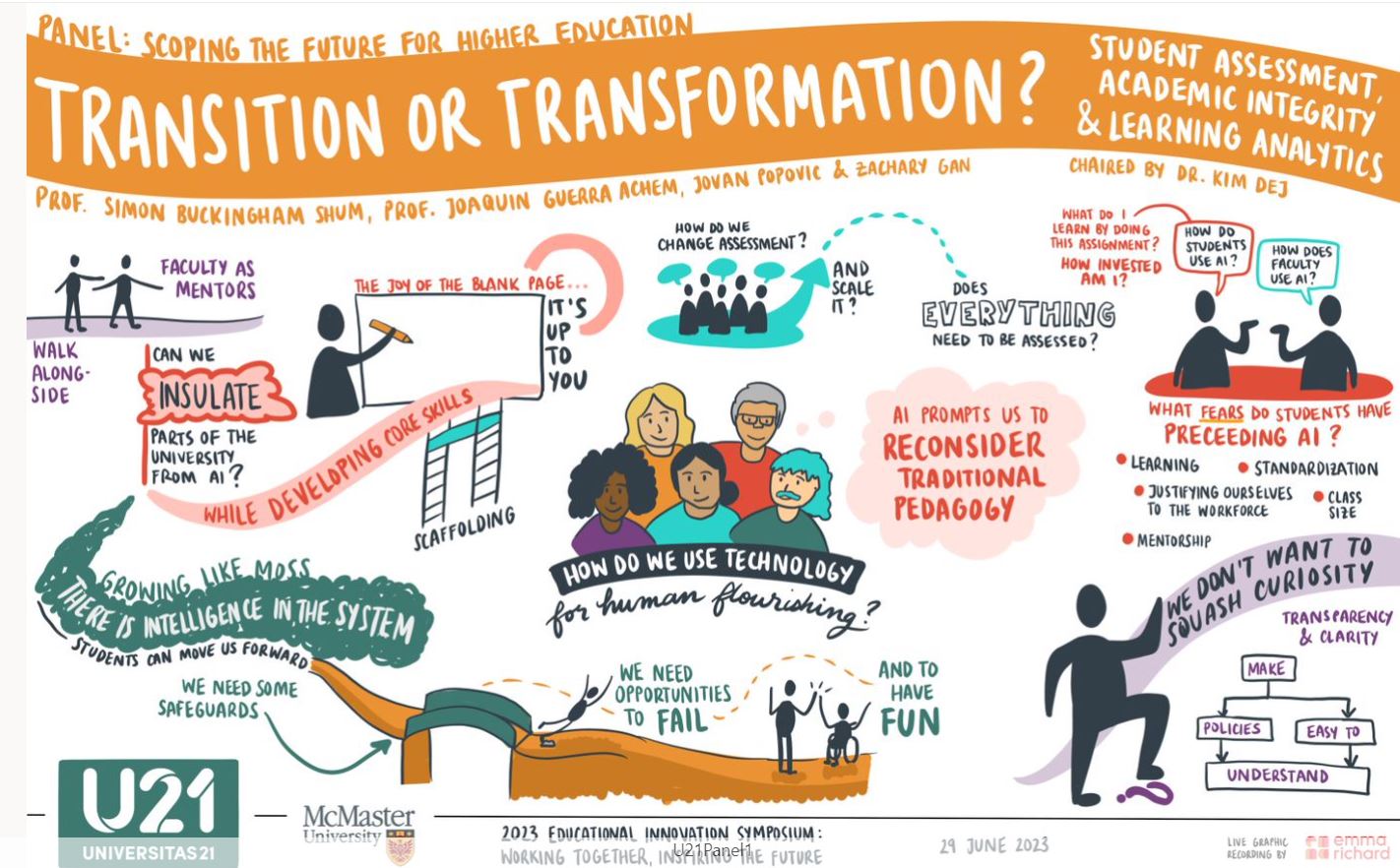U21’s Educational Innovation Symposium, titled ‘Scoping the Future in Higher Education: Transition or Transformation?’ brought together delegates from across the network to tackle some of the big questions currently facing university educators.
The symposium, held at McMaster University, explored issues arising from swiftly advancing technologies such as Artificial Intelligence, which affects many areas of educational practice. This includes curriculum development, the way in which teaching and learning are delivered, assessment practices, digital ethics and, significantly, how students can be part of the conversation.
Inspired by the stimulating keynote address from Professor Simon Buckingham Shum, Director of the Connected Intelligence Centre at the University of Technology, Sydney, discussion traversed topics such as how to sustain a relationship-based, human-centric experience in the context of analytics, to reflecting on the impact of artificial intelligence on the fundamentals of education (Figure 1).

The Impact of Artificial Intelligence
In an era dominated by rapid technological advancements, universities face the challenge of adapting their assessment methods to the age of artificial intelligence (AI). While the issue of authenticity in academic work predates AI, the widespread availability of this technology has opened new avenues for students to access information and potentially compromise the integrity of the work they produce. Furthermore, the use of AI by students, particularly for mundane or routine tasks, raises questions about their engagement with course content. However, this technological shift also presents an opportunity for universities to reassess their course content and delivery, as well as assessment methods. Universities can look to leverage this into an opportunity to collaborate with students in co-creating innovative approaches that ensure meaningful evaluation and genuine learning outcomes.
Student Perspectives and Engagement
Students are now navigating a rapidly changing technological landscape. Rather than viewing their use of AI as disengagement, it can be seen as an opportunity for universities to better understand their learning preferences and foster an environment that encourages critical thinking and creativity. By actively involving students in the conversation surrounding the use of AI in assessments, universities can gain valuable insights into their perspectives and motivations. This approach ensures that assessments remain relevant, meaningful, and aligned with the evolving needs of both academia, industry, governments, and the graduate job market. Universities can foster a culture of innovation and co-creation by establishing student-led committees, hosting workshops and seminars, and leveraging technology platforms to encourage ongoing dialogue and feedback.
Accelerating Change in Assessment and Teaching
The recent accelerated transition to online teaching methods has led to a flourishing of innovative approaches to course delivery Similarly, the advent of AI technology may serve as a catalyst for long-overdue changes in assessment methods and teaching practices. Universities can seize this opportunity to leverage new developments in as a tool for streamlining administrative tasks, providing personalized feedback, and enhancing the efficiency and accuracy of assessment processes. This would allow educators to allocate more time and resources to engaging with students in meaningful discussions, facilitating the critical thinking that is more vital than ever in an online world. The use of AI can support the democratisation of higher education, when applied to areas such as breaking down language barriers, yet it carries the risk of being viewed as a globalisation project that may not be available to all. Political, social and economic factors are still at play with the access to this technology and its adoption into educational delivery. Ensuring that co-creation is an embedded part of any change could offer one path to understanding the risks and impact on all different parties, from the boardroom to the classroom, the server room and beyond.
Universities and the Challenge of Assessing Work Meaningfully
Traditional assessment methods, such as exams and essays, have long been the cornerstone of academic evaluation. However, as AI becomes increasingly accessible, it is crucial for universities to reassess the effectiveness of these methods. While technology can be a valuable tool in enhancing learning experiences, it also poses the risk of compromising academic integrity. Platforms offering essay mills and other similar services have already been a cause for concern, but with the rise of AI, the availability and ease of accessing such services have amplified. Universities must confront this challenge head-on by developing strategies that both guard against misuse, and yet also embrace the possibilities of this technology. It is time for an active role in shaping the dialogue around AI application, and also the ethical approaches that should be adopted.

The Human At The Heart of AI
Speakers and attendees at the event universally emphasised the importance of mapping human values into the increasing use of these technologies (Figure 2). Having compassion and emotional intelligence – those most human of skills – were framed as key to making machine learning and technology serve education better. As the pace of change speeds up, and students and educators are both unsure what career outcomes will be in a relatively short span of years from the present day, networks such as U21 have a role to play in the development of frameworks and principles that take into account ethics and human emotion. Facing these challenges collectively and facilitating communities of learning on this rapidly shifting topic, in partnership with students and peers, can offer a more certain path forward. Indeed, it was suggested that assessment should be seen not just as a way to achieve credentials, but also to encourage student’s growth as well-rounded people and life-long learners. Though the evolving challenges cannot be answered all at once, the human values of connection, collaboration and sharing best practice are routes forward in uncertain times.
The findings from the Educational Innovation Symposium will be drawn on when developing the work programme for the U21 Educational Innovation Cluster to span the next two years.
- Date
